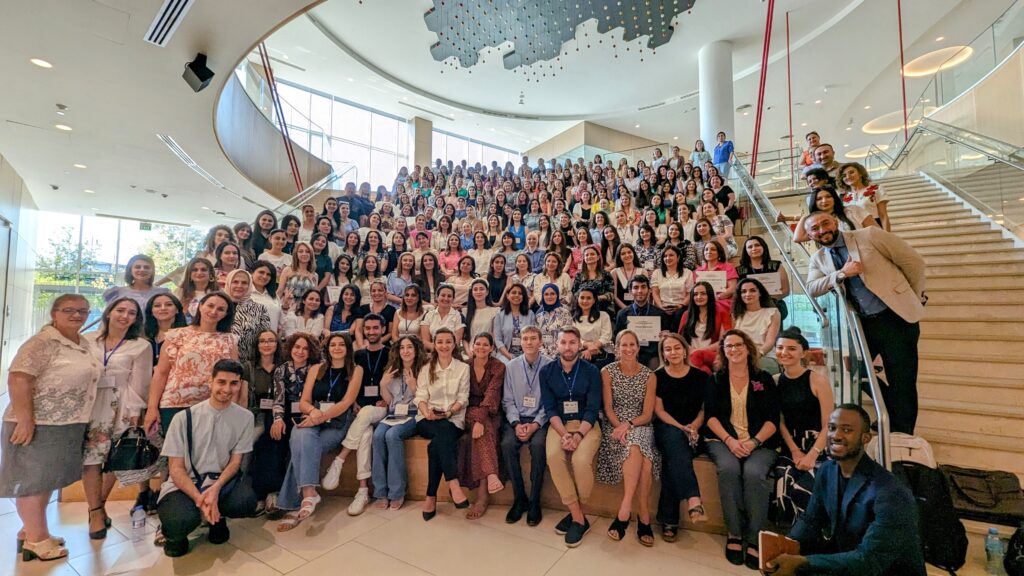There’s an oft-repeated saying that “teachers teach the way they were taught” and this appears to hold true for teachers across the globe. Chinara Ibrahimova saw how that was the case for her classroom when she started teaching English more than 20 years ago in Azerbaijan.
“We were taught in this way: just teach grammar from the textbooks and do the activities from the books and nothing else,” she recalled.
Ibrahimova works at Educational Complex 132-134 in Baku, the country’s capital. She was part of the first cohort in NC State’s English Language Teaching Certificate Program, which is offered in partnership with the U.S. Embassy in Azerbaijan as professional development for K-12 English teachers throughout the country.
“I am a lifelong learner,” Ibrahimova added. “I was chosen among a lot of teachers and I was very happy. It was very fruitful and useful for me.”
GTI staff and faculty-affiliates spent time with Ibrahimova and her students in June 2023. The students were finishing their junior year, and they saw a major difference in their school’s International Baccalaureate program compared to what English language learning was like when they were in primary school, when some of them were taught by Ibrahimova herself.
“In the Azerbaijani curriculum from 1st to 4th grade: when they’re teaching us, they’re teaching only grammar,” explained Nygar Ahadzade. “I was the best at grammar because it was like memorizing. But when it came to speaking, we never had speaking opportunities. We would not really hear our teachers speaking in English because they were explaining English grammar to us in Russian.”
Sofia Huseynli, her classmate, wants to go to university in the United Kingdom or the United States. She knows how important learning English is for her future career and what it takes to achieve a higher level of fluency.
“Instead of just learning grammar and the rules to take a test but to actually practice speaking is great for our progress,” she said. “I like being able to hear other people’s thoughts in English and reflect on it. Now, I can speak fluently, and I’m not scared to speak in English and to share my thoughts.”
Student-Centered Teaching Approaches
NC State’s teacher training program is now in its fourth year, having reached more than 350 English language teachers throughout both the rural and urban parts of the country. Each cohort of about 100 teacher participants completes an 18-week online program where they meet twice a week.

“I was in awe of their sacrifice: that they would put aside two nights a week from their families, after a long day of teaching, to be very engaged with my lecture,” recalled Jillian Haeseler, retired associate teaching professor of English as a Second/Foreign Language, who has been the program’s academic coordinator and primary instructor for all four years. “These teachers made it very clear how much they love teaching.”
Instructors helped the Azerbaijani participants work through the practical applications of the theories and strategies they were learning each week in small group discussion sections. The teachers would record videos from their classrooms to demonstrate how they were implementing some of those changes and how their students were reacting to them.
“I’ve learned a lot through the teachers,” said Paula Wilder, director of international programs at Greensboro College, and one of the program instructors since its beginning. “I’ve learned a lot about this rigid classroom environment that they are in and how they’re really trying to make a difference. To see all the small changes throughout the course each year is really encouraging and fun.”
Small, incremental changes to the English language classrooms are made throughout the 18-week program, but the hope is that it leads to a more sustained impact.
“We want to see if our teacher participants are able to implement anything in the long-term,” said Alison Turner, assistant professor in NC State’s World Languages and Culture Department, who was one of the program instructors for the 2023 cohort. “I think we planted a lot of seeds, and hopefully, our teachers are able to put into practice a lot of the ideas that we were discussing.”
Changing Classroom Environments
Ibrahimova’s students all agreed they like this student-focused environment in the classroom that gives them the opportunity to practice speaking, listening, and thinking in English.
“The most important point is an environment where everyone speaks English because it builds speaking and communication skills,” said Mubariz Yolchiyev, a junior who is studying English as his second foreign language . “I feel the difference when I’m learning English here.”
Ibrahimova agreed that being trained to teach in a different way is also beneficial for her.
“It helped me as well to see how enjoyable it could be for the students,” she added. “As a teacher, I’m growing together with my students.”
- Categories:



